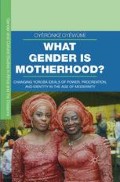Abstract
In the previous chapter, I mentioned the profound historical changes that were under way in Ọ̀yọ́ Yorùbá society in the wake of the demise of the empire and the rise of new polities such as Ibadan and Abeokuta. My interest in these developments has to do with the emergence of not only new towns and new practices, but most especially new names such as the personal or íkì. My objective in this chapter is to determine whether or íkì, unlike other Yorùbá name types, is truly gender-specific and in so doing, interrogate what this search can tell us about the evolution of gender as a social division in Yorùbá society. In examining the meanings of praise names, I joined debates with a group of scholars, most notably linguists, who had written about the nature of or íkì names and the question of gender division in usage. The driving question in the present chapter is: What are the origins of both male and female personal or íkì?
Access this chapter
Tax calculation will be finalised at checkout
Purchases are for personal use only
Preview
Unable to display preview. Download preview PDF.
Notes
See Dejo Faniyi, “ẸKún Ìyàwó: A Traditional Yorùbá Nuptial Chant,” in Yorùbá Oral Tradition: Selections from the Papers Presented at the Seminar on Yorùbá Oral Tradition: Poetry in Music, Dance, and Drama No. 1, ed. Wande Abimbola (Ile-Ife: University of Ife, 1975);
Karin Barber, I Could Speak until Tomorrow: Oríkì, Women, and the Past in a Yorùbá Town (Edinburgh: Edinburgh University Press, 1991);
Samuel Johnson and Obadiah Johnson, The History of the Yorubas: From the Earliest Times to the Beginning of the British Protectorate (Westport, CT: Negro University Press, 1921).
Ladele et al., Iwadii Ijinle Asa Yorùbá (Ibadan: Macmillan, 1986), 167.
B. A. Oyetade, “Tones in the Yorùbá Personal Praise Names: Oríkì Àbísọ,” Research in Yorùbá Language and Literature 1 (1991): 62.
N. A. Fadipe, The Sociology of the Yorùbá (Ibadan: Ibadan University Press, 1970), 81.
For a history of Ibadan, see Bolanle Awe, “The Rise of Ibadan as a Yorùbá Power, 1851–1893” (PhD dissertation, Oxford University, 1964). See Toyin Falola, The Political Economy of a Pre-Colonial African State (Ile-Ife: University of Ife Press, 1984) for a documentation of its slave economy.
See Ruth Watson, Civil Disorder Is the Disease of Ibadan: Chieftaincy & Civic Culture in a Yorùbá City (Oxford: James Currey Publishers, 2003), for a sustained probe of the implications of warmongering and civil strife and the “disease of Ibadan.”
See Ruth Watson, “What Is Our Intelligence, Our School Going and Our Reading of Books without Getting Money? Akinpelu Obisesan and His Diary,” in African Hidden Histories: Everyday Literacy and the Making of the Self, ed. Karin Barber (Bloomington: Indiana University Press, 2006).
Kristin Mann, Marrying Well: Marriage, Status, and Social Change among the Educated Elite in Colonial Lagos (Cambridge: Cambridge University Press, 1985), 42.
Karin Barber, “Documenting Social and Ideological Change through Yoruba Oriki: A Stylistic Analysis,” Journal of the Historical Society of Nigeria 10, no. 4 (June 1981): 39–52, 40.
Lisa A. Lindsay and Stephan Miescher, eds., Men and Masculinities in Modern Africa (Portsmouth, NH: Heinemann, 2003), 4.
R. W. Connell, Masculinities (Los Angeles: University of California Press, 1995), 68; my emphasis.
J. D. Y. Peel, “Gender in Yorùbá Religious Change,” Journal of Religion in Africa 32, no. 2 (2002).
Karin Barber, “Oríkì, Women and the Proliferation and Merging of Òrìṣà,” Africa 60, no. 03b (1990): 320.
Oyèrónké Oyěwùmí, “Introduction. Feminism, Sisterhood, and Other Foreign Relations,” in African Women and Feminism: Reflecting on the Politics of Sisterhood, ed. Oyèrónké Oyěwùmí (New Jersey: Africa World Press, 2003).
Copyright information
© 2016 Oyèrónkẹ́ Oyěwùmí
About this chapter
Cite this chapter
Oyěwùmí, O. (2016). The Poetry of Weeping Brides: The Role and Impact of Marriage Residence in The Making of Praise Names. In: What Gender is Motherhood?. Gender and Cultural Studies in Africa and the Diaspora. Palgrave Macmillan, New York. https://doi.org/10.1057/9781137521255_8
Download citation
DOI: https://doi.org/10.1057/9781137521255_8
Publisher Name: Palgrave Macmillan, New York
Print ISBN: 978-1-349-58051-4
Online ISBN: 978-1-137-52125-5
eBook Packages: Literature, Cultural and Media StudiesLiterature, Cultural and Media Studies (R0)

